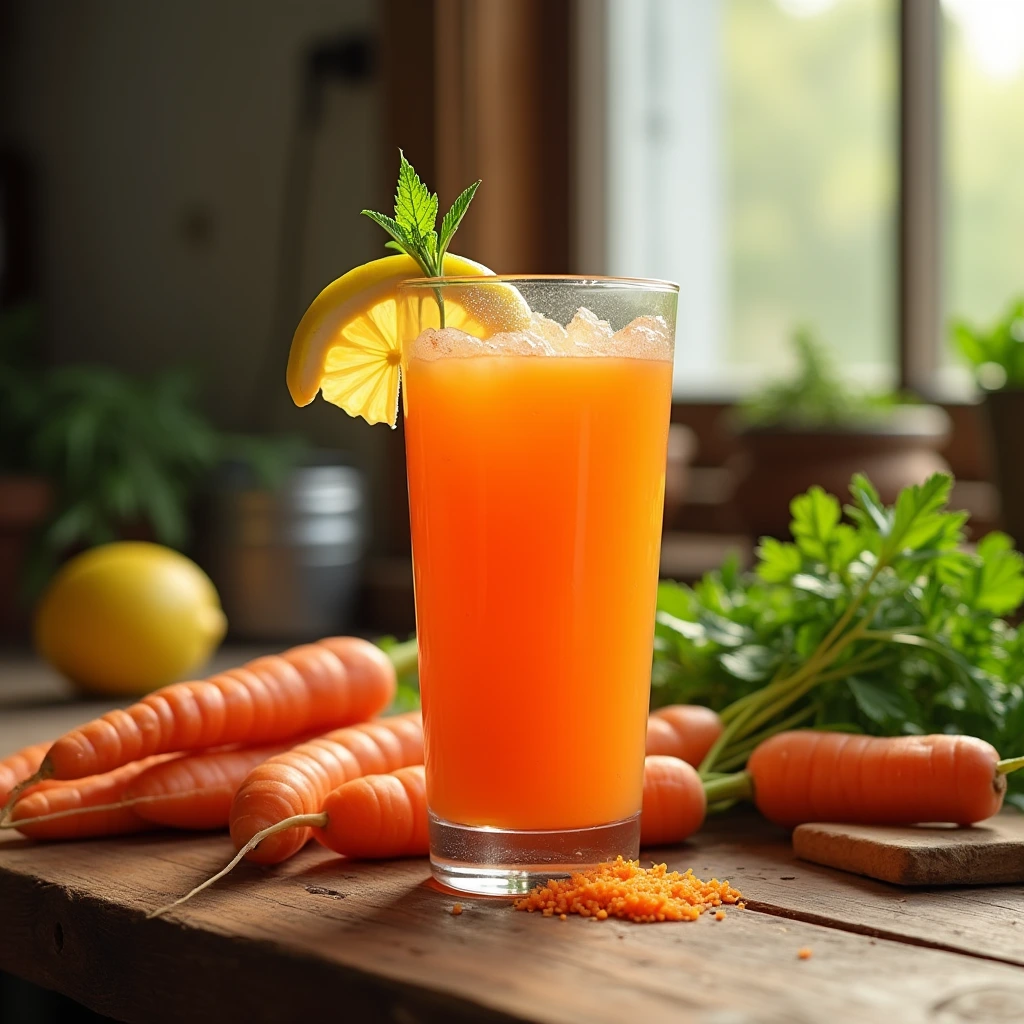Carrot juice isn’t just a tasty drink—it’s a nutrient-packed powerhouse that can do wonders for your health. For starters, it’s loaded with beta-carotene, vitamins A, C, and K, and powerful antioxidants that help boost immunity, improve skin health, and support better vision. In addition, this vibrant juice is incredibly easy to make with just a few simple ingredients. Whether you’re looking for a morning energy boost or a natural way to detox, homemade carrot juice is a great choice. Plus, you can customize it with ingredients like ginger, lemon, or apple for extra flavor and health benefits. Not to mention, proper storage techniques allow you to keep it fresh for longer. So, why not start your journey to better health with this refreshing drink? Let’s dive in and explore how to make the perfect glass of carrot juice!

Benefits of Carrot Juice
Carrot juice is a powerhouse of essential nutrients, making it a favorite for health-conscious individuals. Rich in beta-carotene, which the body converts into vitamin A, it supports strong vision and overall eye health. It’s also packed with vitamins C, K, and B6, as well as potassium and antioxidants, all of which boost immunity and promote overall wellness.
One of carrot juice’s standout benefits is its role in digestion. Its fiber content supports gut health, while its natural enzymes aid in breaking down food. Additionally, the antioxidants in carrots help detoxify the body by neutralizing harmful free radicals and supporting liver function.
For glowing skin, carrot juice is a natural ally. Vitamin A promotes skin cell renewal, while its anti-inflammatory properties help combat acne and skin irritations. Plus, the hydrating nature of carrot juice helps keep skin soft and supple.
Whether you’re looking to enhance immunity, improve digestion, or enjoy clearer skin, carrot juice is a delicious way to nurture your body from the inside out.
Ingredients for Carrot Juice
Making fresh carrot juice requires only a few simple ingredients, but the right choices can elevate its flavor and health benefits. Here’s what you’ll need:
Essential Ingredients:
- Fresh Carrots: Choose firm, brightly colored carrots for maximum sweetness and nutrient content. Organic carrots are ideal to avoid pesticide residues.
Optional Add-Ons:
- Ginger: Adds a spicy kick and offers anti-inflammatory benefits.
- Lemon: Brightens the flavor and provides a dose of vitamin C.
- Apple: Enhances sweetness naturally, balancing the earthy taste of carrots.
- Orange: A tangy addition that complements the carrot’s natural sweetness.
- Turmeric: For added anti-inflammatory and antioxidant properties.
- Mint Leaves: For a refreshing twist.
Tips for Selection: Look for medium-sized carrots, as overly large ones may have a woody texture. Avoid carrots with cracks or soft spots. If using additional ingredients, select fresh, firm produce to ensure the best flavor and nutrient retention.
Mix and match these ingredients to create a juice that’s tailored to your taste and nutritional needs.
Equipment Needed for Carrot Juice
Preparing carrot juice at home is simple with the right tools. Here’s a quick guide to the equipment you’ll need:
1. Juicer:
- Centrifugal Juicer: Quick and efficient for juicing carrots and other firm vegetables.
- Masticating Juicer: Slower but extracts more juice and retains nutrients better.
2. Blender (for alternative methods):
- If you don’t have a juicer, a high-speed blender works well. You’ll need to add some water to blend the carrots smoothly.
3. Strainer or Cheesecloth:
- For blender users, strain the blended mixture through a fine mesh strainer or cheesecloth to separate the juice from the pulp.
4. Knife and Cutting Board:
- Use these to chop carrots into smaller pieces, making them easier to process.
Preparation Tips:
- Wash all equipment thoroughly before use to ensure hygiene.
- Clean the carrots under running water, scrubbing off dirt, and peel if not using organic ones.
- For juicers, follow the manufacturer’s instructions to assemble correctly and ensure smooth operation.
With these tools ready, you’re all set to create fresh, nutrient-packed carrot juice effortlessly!
Step-by-Step Carrot Juice Recipe
1. Prep the Carrots:
- Wash carrots thoroughly under running water to remove dirt. If not using organic carrots, peel the skin for a cleaner flavor.
- Chop the carrots into smaller pieces to fit your juicer or blender.
2. Juicing with a Juicer:
- Feed the carrot pieces into the juicer, following the manufacturer’s instructions.
- Collect the juice in the container provided.
3. Juicing with a Blender:
- Add chopped carrots to the blender with a small amount of water (about ½ cup per 4 medium carrots).
- Blend until smooth, stopping to scrape down the sides if necessary.
4. Strain for a Smoother Texture:
- If using a blender, pour the mixture through a fine mesh strainer or cheesecloth into a bowl.
- Press or squeeze to extract as much juice as possible, leaving the pulp behind.
5. Customize the Flavor:
- Add ginger for a spicy kick, lemon juice for tanginess, or apple for natural sweetness. Adjust to taste.
6. Serve and Enjoy:
- Pour the juice into a glass, serve fresh, and savor the vibrant flavors. Refrigerate leftovers for up to 24 hours.
Tips for Storing Carrot Juice
Proper storage is essential to preserve the nutrients and flavor of carrot juice. Here are the best practices:
1. Refrigeration:
- Store fresh carrot juice in an airtight glass container or jar to prevent oxidation and maintain freshness.
- Fill the container to the brim to minimize air exposure, which can degrade nutrients.
- Keep the juice in the refrigerator and consume it within 24–48 hours for the best flavor and nutritional value.
2. Freezing:
- For longer storage, freeze carrot juice in airtight containers, leaving some space at the top to allow for expansion.
- Use ice cube trays for portion-sized servings; once frozen, transfer the cubes to a freezer-safe bag or container.
- Frozen carrot juice retains its nutrients for up to 3 months, though fresh is always preferred.
3. Thawing and Reusing:
- Thaw frozen juice in the refrigerator overnight. Shake or stir well before drinking to recombine any separated layers.
Additional Tips:
- Avoid storing carrot juice in plastic containers, which may leach chemicals.
- Label containers with the date to track freshness.
By following these storage tips, you can enjoy the health benefits of carrot juice anytime.
Creative Variations for Carrot Juice Recipe
Carrot juice is incredibly versatile, allowing you to get creative with flavors and textures. Here are some fun variations to try:
1. Fruity Additions:
- Orange-Carrot Juice: Combine carrots with oranges for a tangy, refreshing blend packed with vitamin C.
- Pineapple-Carrot Juice: Add fresh pineapple chunks for a tropical twist and natural sweetness.
- Apple-Carrot Juice: Pair carrots with apples to balance earthiness with a crisp, sweet flavor.
2. Spiced Blends:
- Ginger-Carrot Juice: Add a small piece of fresh ginger for a zesty, immune-boosting kick.
- Turmeric-Carrot Juice: Mix in a pinch of turmeric for anti-inflammatory benefits and a hint of warmth.
- Cinnamon-Carrot Juice: Sprinkle cinnamon for a cozy, mildly sweet flavor.
3. Creamy Smoothie Option:
- Blend carrot juice with a banana, Greek yogurt, or almond milk for a creamy, nutrient-rich smoothie.
- Toss in chia seeds or flaxseeds for added fiber and omega-3s.
Tips for Experimenting:
- Start with small amounts of add-ons and adjust to taste.
- Garnish with mint leaves or a slice of fruit for a visually appealing and aromatic touch.
Enjoy exploring these variations to find your perfect carrot juice combination!
FAQs About The Recipe
1. How many carrots are needed for one glass of juice?
You’ll need about 4–6 medium-sized carrots to make one 8-ounce glass of juice, depending on their size and juiciness.
2. Can carrot juice be made without a juicer?
Yes! Use a blender to blend chopped carrots with a small amount of water. Then, strain the mixture through a fine mesh strainer or cheesecloth to separate the juice from the pulp.
3. How long does fresh carrot juice last?
Fresh carrot juice lasts up to 24–48 hours in the refrigerator when stored in an airtight container. It’s best consumed immediately for maximum nutrients.
4. Is it better to drink carrot juice on an empty stomach?
Drinking carrot juice on an empty stomach can enhance nutrient absorption and provide a refreshing start to the day. However, it can be enjoyed at any time.
5. Can carrot juice be stored in the freezer?
Yes! Freeze carrot juice in airtight containers or ice cube trays for up to 3 months. Thaw in the refrigerator before use.
6. What are the risks of drinking too much carrot juice?
Excessive carrot juice may cause carotenemia, a harmless condition where skin turns yellow-orange due to high beta-carotene levels. Moderation is key.
Other Questions
1. Is it OK to drink carrot juice every day?
Yes, drinking carrot juice daily is generally safe and offers numerous health benefits. However, moderation is key—limit intake to about 1 cup (8 ounces) per day to avoid excessive beta-carotene, which may lead to carotenemia (a harmless yellowing of the skin).
2. What fruits pair with carrots?
Carrots pair well with a variety of fruits, including oranges, apples, pineapples, and mangoes. These fruits enhance the sweetness and flavor of carrot juice while adding additional vitamins and nutrients.
3. Should you soak carrots in water before juicing?
It’s not necessary to soak carrots before juicing, but washing them thoroughly under running water is essential to remove dirt and debris. If the carrots are not organic, consider peeling them to eliminate pesticide residues.
4. How many carrots make a glass of juice?
You’ll need about 4–6 medium-sized carrots to make one 8-ounce glass of fresh carrot juice, depending on their size and juiciness. Adjust the quantity based on your preferred thickness and sweetness.
Let’s Try The Recipe
Carrot juice is a simple, delicious, and nutrient-packed beverage that can transform your health routine. With its rich content of vitamins, minerals, and antioxidants, it supports immunity, improves digestion, promotes healthy skin, and enhances vision. Whether you use a juicer or a blender, making carrot juice at home is an easy and rewarding process.
This recipe offers the flexibility to experiment with add-ons like ginger, lemon, apple, or even turmeric to suit your taste and nutritional goals. You can also try variations like creamy carrot smoothies or tropical blends to keep your juice routine exciting.
Homemade carrot juice not only allows you to control the quality of your ingredients but also helps you avoid added sugars and preservatives found in store-bought versions. Plus, it’s a wonderful way to get creative in the kitchen.
So, why wait? Grab some fresh carrots and your favorite add-ons, and start juicing your way to better health. Remember, every glass of homemade carrot juice is a step toward a healthier, more vibrant you. Cheers to wellness!
More
For those who enjoy Carrot Juice and want to explore more nutrient-rich beverages or healthy recipes, Quickly Taste offers several related options. If you love fresh juices, try Strawberry Blueberry Smoothie for an antioxidant-packed drink or Tart Cherry Juice for a tangy, inflammation-fighting boost. For a meal pairing, Broccoli Cauliflower Salad is a great choice to complement your healthy lifestyle.
If you’re interested in experimenting with protein-rich options, Protein Muffins or Protein Pasta provide energy-packed meals that work well with a fresh glass of carrot juice. Looking for a warm and comforting alternative? Pumpkin Oatmeal Cookies make a delicious, fiber-rich snack to enjoy alongside your juice.
For external resources, Healthline’s guide on carrot nutrition provides in-depth health benefits, while National Institutes of Health (NIH) offers research-backed insights into vitamins and antioxidants found in carrots. Whether you’re new to juicing or looking for creative variations, these resources will help you make the most of your health journey!
